Approaches to Supplier Selection for Improving Business Performance
VerifiedAdded on 2022/12/30
|5
|1147
|31
AI Summary
This article provides a critical analysis of approaches used by managers in selecting suppliers to improve business performance. It discusses the growing importance of outsourcing suppliers, the use of lean manufacturing standpoint to assess suppliers' quality and efficiency, and the significance of benchmarks in reducing subjectivity in supplier evaluation. The article also explores the difference between 'hard' and 'soft' supplier selection criteria and the continual competitive demands experienced by US and European business corporations.
Contribute Materials
Your contribution can guide someone’s learning journey. Share your
documents today.
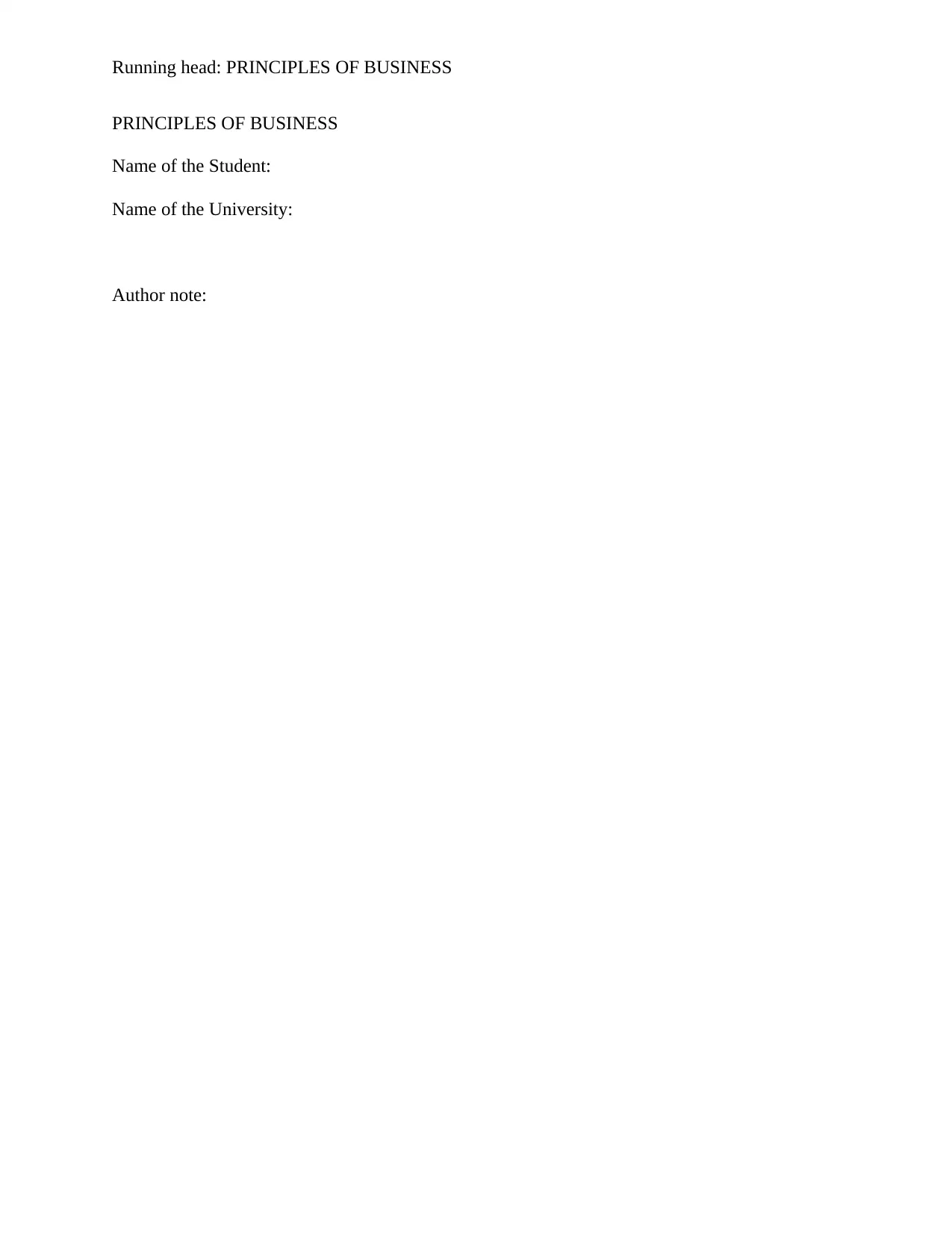
Running head: PRINCIPLES OF BUSINESS
PRINCIPLES OF BUSINESS
Name of the Student:
Name of the University:
Author note:
PRINCIPLES OF BUSINESS
Name of the Student:
Name of the University:
Author note:
Secure Best Marks with AI Grader
Need help grading? Try our AI Grader for instant feedback on your assignments.
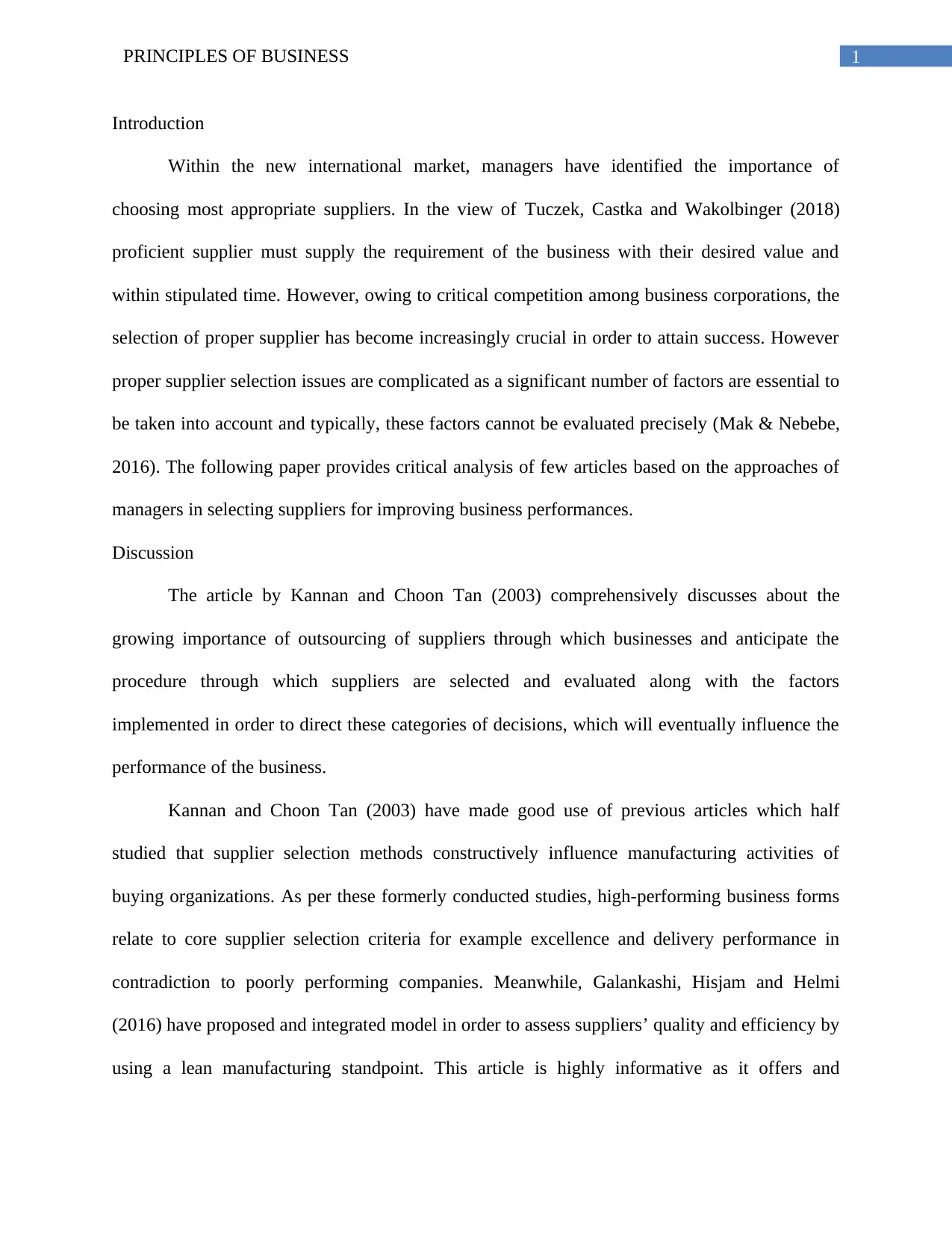
1PRINCIPLES OF BUSINESS
Introduction
Within the new international market, managers have identified the importance of
choosing most appropriate suppliers. In the view of Tuczek, Castka and Wakolbinger (2018)
proficient supplier must supply the requirement of the business with their desired value and
within stipulated time. However, owing to critical competition among business corporations, the
selection of proper supplier has become increasingly crucial in order to attain success. However
proper supplier selection issues are complicated as a significant number of factors are essential to
be taken into account and typically, these factors cannot be evaluated precisely (Mak & Nebebe,
2016). The following paper provides critical analysis of few articles based on the approaches of
managers in selecting suppliers for improving business performances.
Discussion
The article by Kannan and Choon Tan (2003) comprehensively discusses about the
growing importance of outsourcing of suppliers through which businesses and anticipate the
procedure through which suppliers are selected and evaluated along with the factors
implemented in order to direct these categories of decisions, which will eventually influence the
performance of the business.
Kannan and Choon Tan (2003) have made good use of previous articles which half
studied that supplier selection methods constructively influence manufacturing activities of
buying organizations. As per these formerly conducted studies, high-performing business forms
relate to core supplier selection criteria for example excellence and delivery performance in
contradiction to poorly performing companies. Meanwhile, Galankashi, Hisjam and Helmi
(2016) have proposed and integrated model in order to assess suppliers’ quality and efficiency by
using a lean manufacturing standpoint. This article is highly informative as it offers and
Introduction
Within the new international market, managers have identified the importance of
choosing most appropriate suppliers. In the view of Tuczek, Castka and Wakolbinger (2018)
proficient supplier must supply the requirement of the business with their desired value and
within stipulated time. However, owing to critical competition among business corporations, the
selection of proper supplier has become increasingly crucial in order to attain success. However
proper supplier selection issues are complicated as a significant number of factors are essential to
be taken into account and typically, these factors cannot be evaluated precisely (Mak & Nebebe,
2016). The following paper provides critical analysis of few articles based on the approaches of
managers in selecting suppliers for improving business performances.
Discussion
The article by Kannan and Choon Tan (2003) comprehensively discusses about the
growing importance of outsourcing of suppliers through which businesses and anticipate the
procedure through which suppliers are selected and evaluated along with the factors
implemented in order to direct these categories of decisions, which will eventually influence the
performance of the business.
Kannan and Choon Tan (2003) have made good use of previous articles which half
studied that supplier selection methods constructively influence manufacturing activities of
buying organizations. As per these formerly conducted studies, high-performing business forms
relate to core supplier selection criteria for example excellence and delivery performance in
contradiction to poorly performing companies. Meanwhile, Galankashi, Hisjam and Helmi
(2016) have proposed and integrated model in order to assess suppliers’ quality and efficiency by
using a lean manufacturing standpoint. This article is highly informative as it offers and
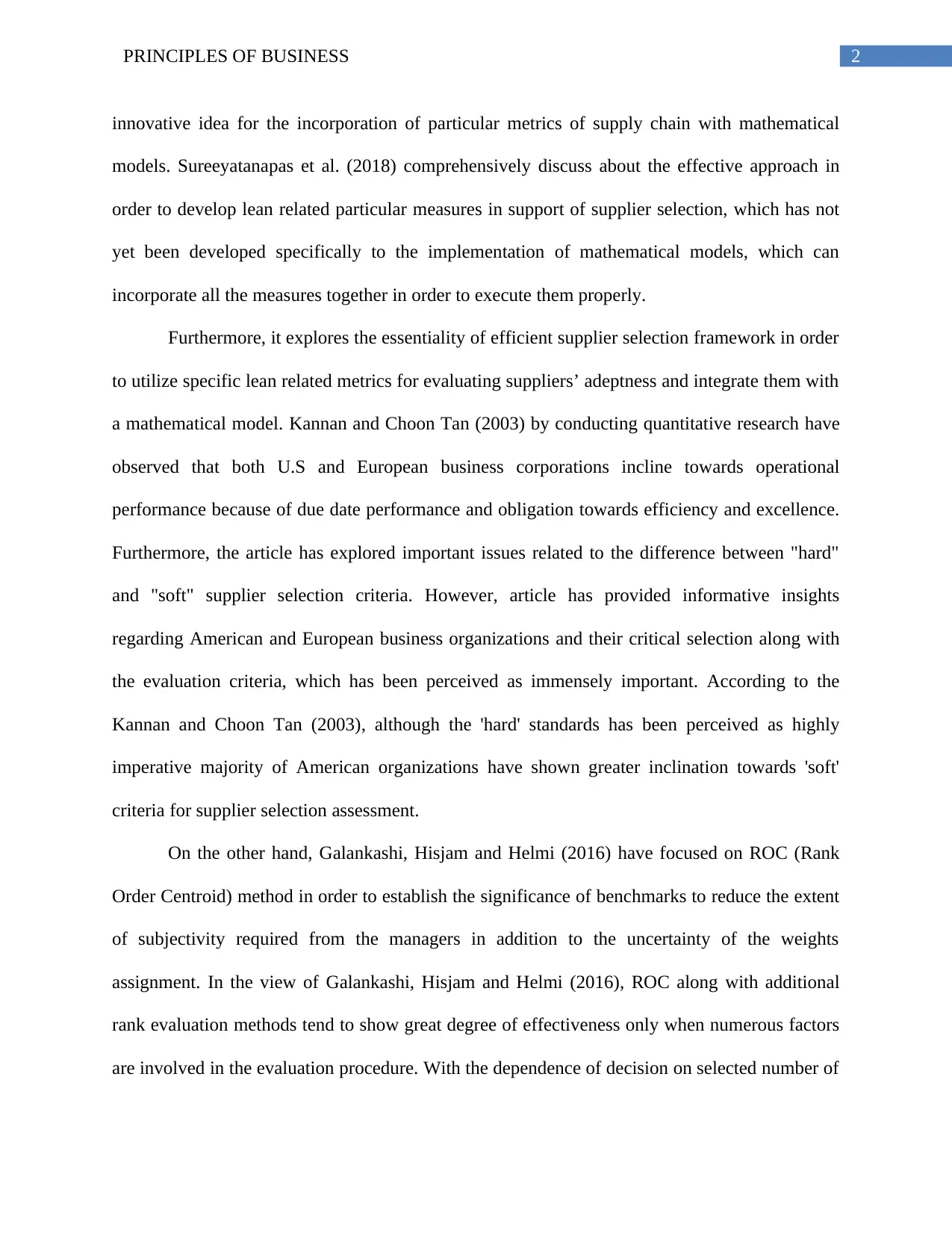
2PRINCIPLES OF BUSINESS
innovative idea for the incorporation of particular metrics of supply chain with mathematical
models. Sureeyatanapas et al. (2018) comprehensively discuss about the effective approach in
order to develop lean related particular measures in support of supplier selection, which has not
yet been developed specifically to the implementation of mathematical models, which can
incorporate all the measures together in order to execute them properly.
Furthermore, it explores the essentiality of efficient supplier selection framework in order
to utilize specific lean related metrics for evaluating suppliers’ adeptness and integrate them with
a mathematical model. Kannan and Choon Tan (2003) by conducting quantitative research have
observed that both U.S and European business corporations incline towards operational
performance because of due date performance and obligation towards efficiency and excellence.
Furthermore, the article has explored important issues related to the difference between "hard"
and "soft" supplier selection criteria. However, article has provided informative insights
regarding American and European business organizations and their critical selection along with
the evaluation criteria, which has been perceived as immensely important. According to the
Kannan and Choon Tan (2003), although the 'hard' standards has been perceived as highly
imperative majority of American organizations have shown greater inclination towards 'soft'
criteria for supplier selection assessment.
On the other hand, Galankashi, Hisjam and Helmi (2016) have focused on ROC (Rank
Order Centroid) method in order to establish the significance of benchmarks to reduce the extent
of subjectivity required from the managers in addition to the uncertainty of the weights
assignment. In the view of Galankashi, Hisjam and Helmi (2016), ROC along with additional
rank evaluation methods tend to show great degree of effectiveness only when numerous factors
are involved in the evaluation procedure. With the dependence of decision on selected number of
innovative idea for the incorporation of particular metrics of supply chain with mathematical
models. Sureeyatanapas et al. (2018) comprehensively discuss about the effective approach in
order to develop lean related particular measures in support of supplier selection, which has not
yet been developed specifically to the implementation of mathematical models, which can
incorporate all the measures together in order to execute them properly.
Furthermore, it explores the essentiality of efficient supplier selection framework in order
to utilize specific lean related metrics for evaluating suppliers’ adeptness and integrate them with
a mathematical model. Kannan and Choon Tan (2003) by conducting quantitative research have
observed that both U.S and European business corporations incline towards operational
performance because of due date performance and obligation towards efficiency and excellence.
Furthermore, the article has explored important issues related to the difference between "hard"
and "soft" supplier selection criteria. However, article has provided informative insights
regarding American and European business organizations and their critical selection along with
the evaluation criteria, which has been perceived as immensely important. According to the
Kannan and Choon Tan (2003), although the 'hard' standards has been perceived as highly
imperative majority of American organizations have shown greater inclination towards 'soft'
criteria for supplier selection assessment.
On the other hand, Galankashi, Hisjam and Helmi (2016) have focused on ROC (Rank
Order Centroid) method in order to establish the significance of benchmarks to reduce the extent
of subjectivity required from the managers in addition to the uncertainty of the weights
assignment. In the view of Galankashi, Hisjam and Helmi (2016), ROC along with additional
rank evaluation methods tend to show great degree of effectiveness only when numerous factors
are involved in the evaluation procedure. With the dependence of decision on selected number of
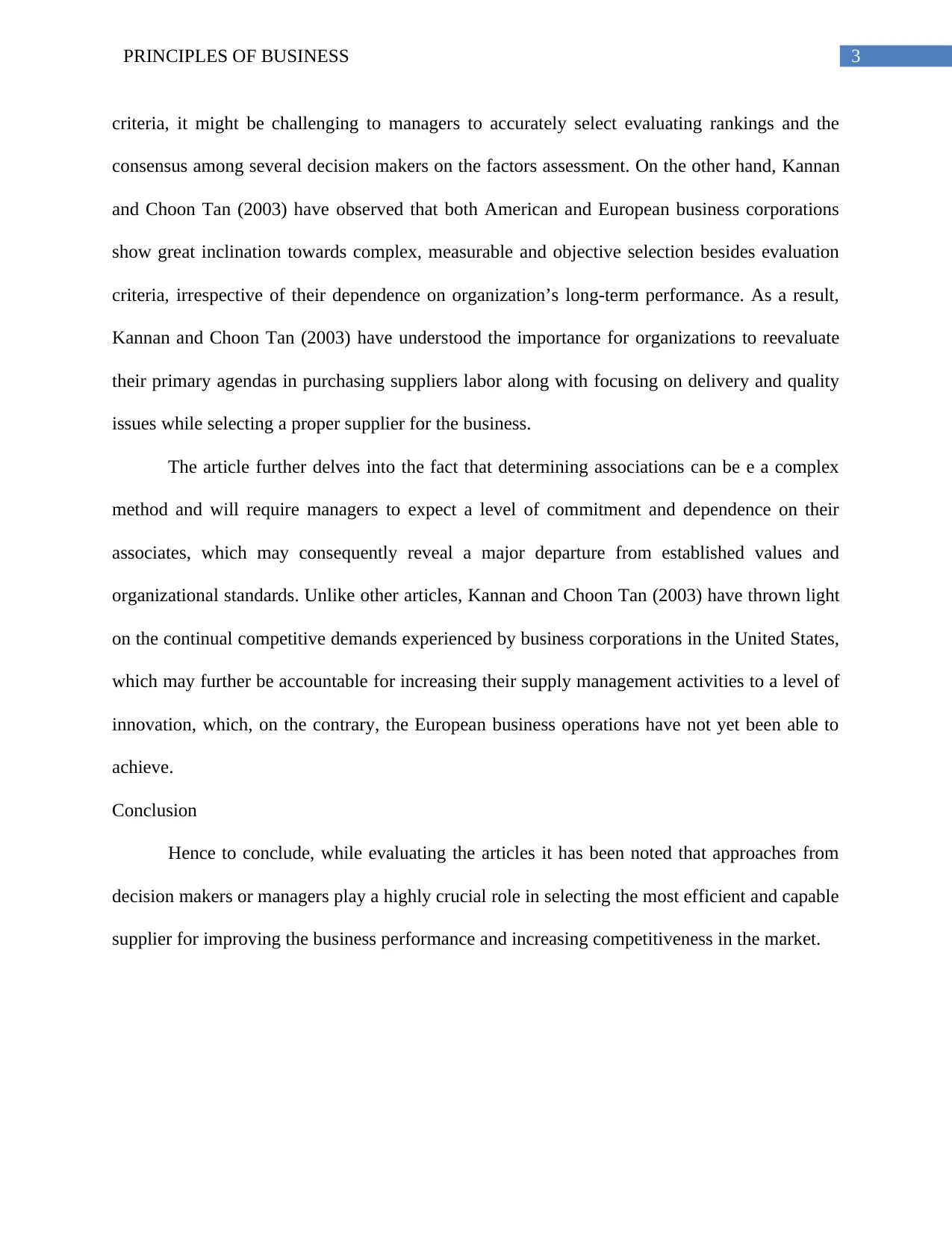
3PRINCIPLES OF BUSINESS
criteria, it might be challenging to managers to accurately select evaluating rankings and the
consensus among several decision makers on the factors assessment. On the other hand, Kannan
and Choon Tan (2003) have observed that both American and European business corporations
show great inclination towards complex, measurable and objective selection besides evaluation
criteria, irrespective of their dependence on organization’s long-term performance. As a result,
Kannan and Choon Tan (2003) have understood the importance for organizations to reevaluate
their primary agendas in purchasing suppliers labor along with focusing on delivery and quality
issues while selecting a proper supplier for the business.
The article further delves into the fact that determining associations can be e a complex
method and will require managers to expect a level of commitment and dependence on their
associates, which may consequently reveal a major departure from established values and
organizational standards. Unlike other articles, Kannan and Choon Tan (2003) have thrown light
on the continual competitive demands experienced by business corporations in the United States,
which may further be accountable for increasing their supply management activities to a level of
innovation, which, on the contrary, the European business operations have not yet been able to
achieve.
Conclusion
Hence to conclude, while evaluating the articles it has been noted that approaches from
decision makers or managers play a highly crucial role in selecting the most efficient and capable
supplier for improving the business performance and increasing competitiveness in the market.
criteria, it might be challenging to managers to accurately select evaluating rankings and the
consensus among several decision makers on the factors assessment. On the other hand, Kannan
and Choon Tan (2003) have observed that both American and European business corporations
show great inclination towards complex, measurable and objective selection besides evaluation
criteria, irrespective of their dependence on organization’s long-term performance. As a result,
Kannan and Choon Tan (2003) have understood the importance for organizations to reevaluate
their primary agendas in purchasing suppliers labor along with focusing on delivery and quality
issues while selecting a proper supplier for the business.
The article further delves into the fact that determining associations can be e a complex
method and will require managers to expect a level of commitment and dependence on their
associates, which may consequently reveal a major departure from established values and
organizational standards. Unlike other articles, Kannan and Choon Tan (2003) have thrown light
on the continual competitive demands experienced by business corporations in the United States,
which may further be accountable for increasing their supply management activities to a level of
innovation, which, on the contrary, the European business operations have not yet been able to
achieve.
Conclusion
Hence to conclude, while evaluating the articles it has been noted that approaches from
decision makers or managers play a highly crucial role in selecting the most efficient and capable
supplier for improving the business performance and increasing competitiveness in the market.
Secure Best Marks with AI Grader
Need help grading? Try our AI Grader for instant feedback on your assignments.
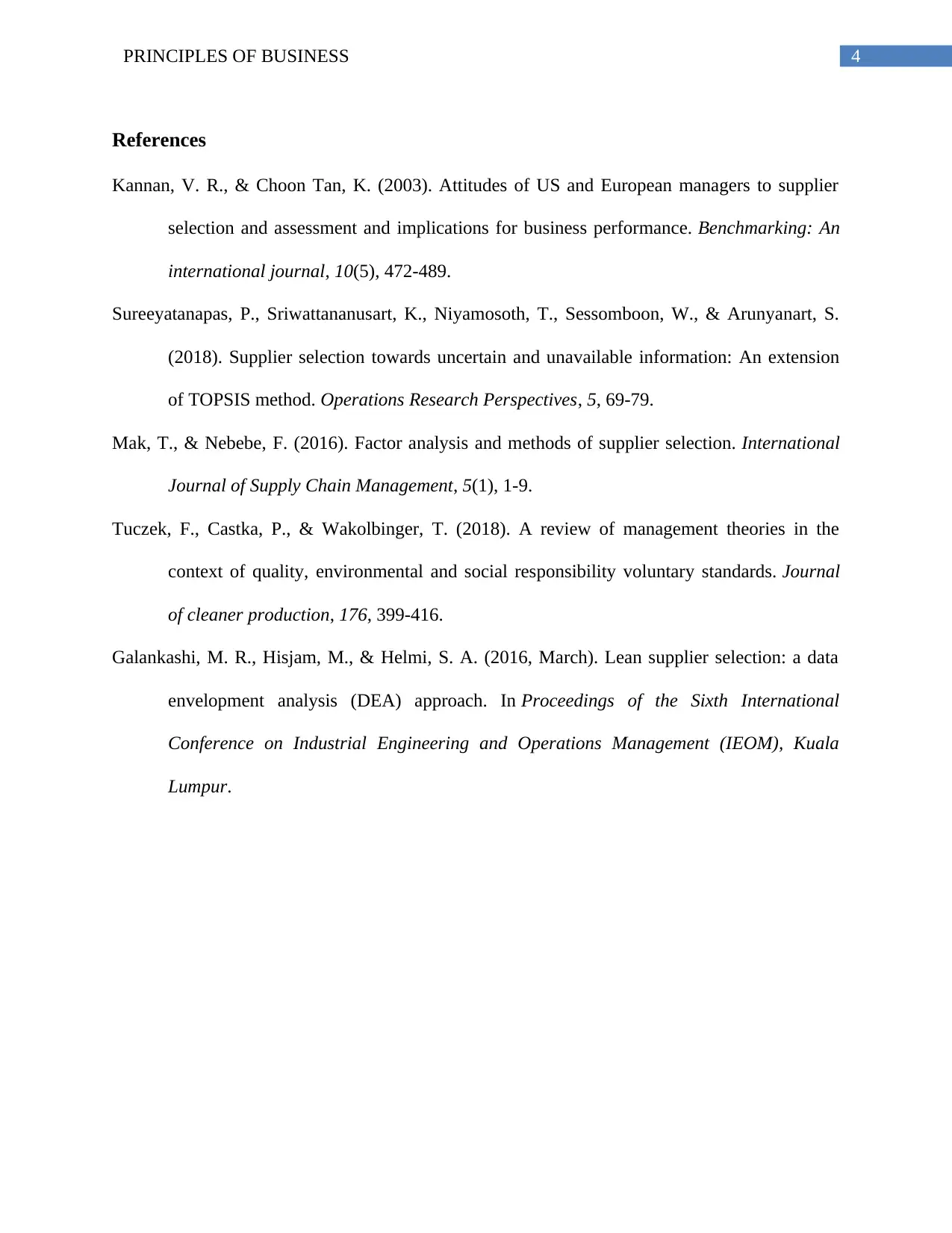
4PRINCIPLES OF BUSINESS
References
Kannan, V. R., & Choon Tan, K. (2003). Attitudes of US and European managers to supplier
selection and assessment and implications for business performance. Benchmarking: An
international journal, 10(5), 472-489.
Sureeyatanapas, P., Sriwattananusart, K., Niyamosoth, T., Sessomboon, W., & Arunyanart, S.
(2018). Supplier selection towards uncertain and unavailable information: An extension
of TOPSIS method. Operations Research Perspectives, 5, 69-79.
Mak, T., & Nebebe, F. (2016). Factor analysis and methods of supplier selection. International
Journal of Supply Chain Management, 5(1), 1-9.
Tuczek, F., Castka, P., & Wakolbinger, T. (2018). A review of management theories in the
context of quality, environmental and social responsibility voluntary standards. Journal
of cleaner production, 176, 399-416.
Galankashi, M. R., Hisjam, M., & Helmi, S. A. (2016, March). Lean supplier selection: a data
envelopment analysis (DEA) approach. In Proceedings of the Sixth International
Conference on Industrial Engineering and Operations Management (IEOM), Kuala
Lumpur.
References
Kannan, V. R., & Choon Tan, K. (2003). Attitudes of US and European managers to supplier
selection and assessment and implications for business performance. Benchmarking: An
international journal, 10(5), 472-489.
Sureeyatanapas, P., Sriwattananusart, K., Niyamosoth, T., Sessomboon, W., & Arunyanart, S.
(2018). Supplier selection towards uncertain and unavailable information: An extension
of TOPSIS method. Operations Research Perspectives, 5, 69-79.
Mak, T., & Nebebe, F. (2016). Factor analysis and methods of supplier selection. International
Journal of Supply Chain Management, 5(1), 1-9.
Tuczek, F., Castka, P., & Wakolbinger, T. (2018). A review of management theories in the
context of quality, environmental and social responsibility voluntary standards. Journal
of cleaner production, 176, 399-416.
Galankashi, M. R., Hisjam, M., & Helmi, S. A. (2016, March). Lean supplier selection: a data
envelopment analysis (DEA) approach. In Proceedings of the Sixth International
Conference on Industrial Engineering and Operations Management (IEOM), Kuala
Lumpur.
1 out of 5
Your All-in-One AI-Powered Toolkit for Academic Success.
+13062052269
info@desklib.com
Available 24*7 on WhatsApp / Email
![[object Object]](/_next/static/media/star-bottom.7253800d.svg)
Unlock your academic potential
© 2024 | Zucol Services PVT LTD | All rights reserved.